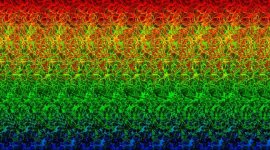Sure, and these "experts" on perceptual testing, who have spent all their time in the joke that is the audio industry, would be laughed out of the room if they presented their test "methods" in front of anyone from the pharmaceutical industry.
And that's because people in the so-called high end audio business staunchly refuse to consider an objective metric for their products, even if it is not directly related to the technical specifications. The pressure to differentiate from the competitor pushed the subjective crapola to paroxysm, and the end result was a dying industry, as a business and unfortunately also by natural attrition. And then, of course, came the extinction level events of the Millenial generation (who doesn't give a hoot on any media reproduction quality, provided it's available anytime/anywhere) and the advent of the mobile devices. Game over.
Sure, some people who would count themselves as subjectivists don't have a clue about technology - similarly some who categorise themselves as objectivists don't have a clue about auditory perception - remember this is a hobby about listening to & enjoying music, not reading oscilloscopes or FFT plots - yet these same people pontificate about perceptual testing as if they knew something about it
This is a very common obfuscating tactic; auditory perception is a very serious (and objective!) business, if done right. Confusing auditory perception investigations with anecdotic stories about e.g. the sound changes when replacing power cords is ridiculous, if not straight insulting to anybody with a STEM undergraduate degree. But most people are polite, and instead of telling it straight in your face what they think, they choose the easy way out: they don't buy your products and let you stew in your own self inflicted world.
You do the statistics of people with STEM education that are putting their money where M. Fremer tells them to. Don't be surprised by the result.
Sure, and these "experts" on perceptual testing, who have spent all their time in the joke that is the "hi-end" audio industry, would be laughed out of the room if they presented their test "methods" in front of anyone from the pharmaceutical industry.
Thank you - I appreciate you demonstrating the point I made - not knowing the difference between perceptual testing & drug testing is proof positive that the basics of what Jakob, I & others post here about perceptual testing is ignored by those who wish to be ignorant of this aspect of the hobby, preferring it seems to stay inside a comforting cocoon where they feel unchallenged & don't feel under stress to learn anything new.
You seem to be projecting your own disappointment onto someone who has spent a successful working life in designing audio devices which have been highly regarded by many. We all have tried to work out as best we can our way of living in the world with whatever work/life balance works for us. Those who do what they enjoy & can make a living at it are the lucky few, despite begrudgery by others.
Couldn’t be further from the truth. If you do well and enjoy it, I’m happy for you.
All this armchair psychology still doesn’t change the facts.
I had loved this comparison between the audio industry and the pharmaceutical industry, which is , along with fertilizers and pesticides one, one of the most dishonest industries that exists. Thank God, they are under close surveillance.
And that's because people in the so-called high end audio business staunchly refuse to consider an objective metric for their products, even if it is not directly related to the technical specifications. The pressure to differentiate from the competitor pushed the subjective crapola to paroxysm, and the end result was a dying industry, as a business and unfortunately also by natural attrition. And then, of course, came the extinction level events of the Millenial generation (who doesn't give a hoot on any media reproduction quality, provided it's available anytime/anywhere) and the advent of the mobile devices. Game over.
Yes, the industry has declined due to avarice, BS & the lack of interest from the general public in sound quality.
Doesn't mean there isn't some new learnings to be had in what makes for sound reproduction which better matches our internal auditory model/framework & better engages us with interest in the music we are listening to
Thank you - I appreciate you demonstrating the point I made - not knowing the difference between perceptual testing & drug testing is proof positive that the basics of what Jakob, I & others post here about perceptual testing is ignored by those who wish to be ignorant of this aspect of the hobby, preferring it seems to stay inside a comforting cocoon where they feel unchallenged & don't feel under stress to learn anything new.
Ah yes, I forgot those of us who work in the real world are in the tiny cocoon. Not the tiny industry that continues to shrink into irrelevance and fails to prove any of its assertions.
I had loved this comparison between the audio industry and the pharmaceutical industry, which is , along with fertilizers and pesticides one, one of the most dishonest industries that exists. Thank God, they are under close surveillance.
Most industries are under regulated. You should be glad no one cares enough to regulate high end audio. Drugs in theory have to prove safety and efficacy, and while it is not perfect, it is a far cry from nothing.
High end audio is very much like the supplement industry. Unregulated and full of snake oil.
Exactly - so you do put some measure on the buying public, unlike chris719? If a product is just a sham it will eventually die out from lack of sales. Someone who has been successful all their life in the audio business is delivering something that the people want.This is a very common obfuscating tactic; auditory perception is a very serious (and objective!) business, if done right. Confusing auditory perception investigations with anecdotic stories about e.g. the sound changes when replacing power cords is ridiculous, if not straight insulting to anybody with a STEM undergraduate degree. But most people are polite, and instead of telling it straight in your face what they think, they choose the easy way out: they don't buy your products and let you stew in your own self inflicted world.
I don't know - got any stats you can offer?You do the statistics of people with STEM education that are putting their money where M. Fremer tells them to. Don't be surprised by the result.
Great, We're all happy then (including JC whose thread this is - as that was who I thought you were referring to in your comments about a lif in audio design)- what's the beef you have again? 😕Couldn’t be further from the truth. If you do well and enjoy it, I’m happy for you.
All this armchair psychology still doesn’t change the facts.
Or, is that the beef? Sorry, I just can't seem to get the point you are making?Ah yes, I forgot those of us who work in the real world are in the tiny cocoon. Not the tiny industry that continues to shrink into irrelevance and fails to prove any of its assertions.
I had loved this comparison between the audio industry and the pharmaceutical industry, which is , along with fertilizers and pesticides one, one of the most dishonest industries that exists. Thank God, they are under close surveillance.
Yea but the was actually trying to make a point about blind testing methods/protocols between the pharma industry & audio industry without much knowledge of which he speaks.
Yea but the was actually trying to make a point about blind testing methods/protocols between the pharma industry & audio industry without much knowledge of which he speaks.
Yes, because the high-end audio electronics "industry" has no methods or protocols. It's all ********. Get some silver wire, sprinkle in some Bybees, come up with some half-baked theories to craft a story, that's all you need.
Great, We're all happy then - what's the beef you have again? 😕
Or, is that the beef? Sorry, I just can't seem to get the point you are making?
My beef was with your assertion that so-called objectivists are the closed-minded ones and clinging to comfort. This is exactly what the subjectivists are guilty of. Clinging to your fringe beliefs in the face of all real evidence.
Can someone let me know when the ranting ends?
Alas, that is somewhere between now and forever.
jn

On first inspection this looks like swirly multicoloured randomness BUT there is a hidden message contained.
Good audio systems are similar, all the information is presented but it can take different 'modes' of listening to reveal ALL the truths and this is where ABX testing with short cycle times can fail and deliver false negatives.
Any photo experts here, how can the above image be processed to enhance or to obscure the hidden message, and what are the parallels to audio processing and system distortions ?.
Dan.
Last edited:
Can someone let me know when the marketing ploy ends?Can someone let me know when the ranting ends?
I've always leaned toward objectivism, and it's writing like this (which has little or nothing to do with audio, but a lot to do with ... [keeping on topic] what I see subjectivists do) that have helped keep me on the objectivist side:
Why I have given up - Dr Susan Blackmore
BTW, I predict this thread will never end.
Why I have given up - Dr Susan Blackmore
BTW, I predict this thread will never end.
Lol, I the objective one see three major planes of image random shapes with three more planes between the mid and far planes, what is this subjective talk of headaches and sudden expression of emotions.....you must be recognising patterns and/or constructing patterns in the phantom images that my measurements do not capture. 😉I do indeed feel the love Dan. Thanks for the headache!
Dan.
When did you decide to dedicate your life to save the V.I.P.s from the misdeeds of the luxury and fashion industry?High end audio is very much like the supplement industry. Unregulated and full of snake oil.
No one prevents you from buying work clothes.
Attachments
Last edited:
- Status
- Not open for further replies.
- Home
- Member Areas
- The Lounge
- John Curl's Blowtorch preamplifier part III

